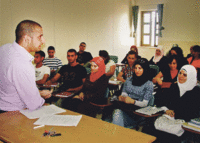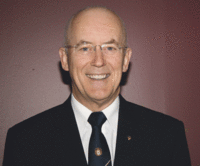World News
Cecily McNeill
1 November 2012
 Hope… Security… Care… Challenge… are among the realities of life at Bethlehem University embodied in students such as Raed Handal who return from overseas study to join the faculty.
Hope… Security… Care… Challenge… are among the realities of life at Bethlehem University embodied in students such as Raed Handal who return from overseas study to join the faculty.
In 2010 Raed graduated from the Shucri Ibrahim Dabdoub Faculty of Business Administration at Bethlehem University.
‘The best decision I made in my life,’ Raed says, ‘was investing myself in Bethlehem University, which I could do more readily since I received a scholarship.’
Raed is now back in Palestine working as a teacher, having earned his Masters in Business Administration in the US from Lewis University, near Chicago. Raed and others like him have taken on leadership roles in the Holy Land, to help to develop a new generation of Palestinian students.‘I felt that it really was important for me to come back to Palestine, bringing with me new knowledge and wisdom to share with my students by teaching at Bethlehem University.’
In Wellington last June the university’s vice-chancellor, Br Peter Bray, spoke of the challenge of bringing faculty from overseas universities to work at Bethlehem University.
 The university is not allowed to bring in teachers and staff from New Zealand, Australia, the United States or other western countries, Br Peter said. So the university employs former students who have completed post-graduate study outside the country.
The university is not allowed to bring in teachers and staff from New Zealand, Australia, the United States or other western countries, Br Peter said. So the university employs former students who have completed post-graduate study outside the country.
Meanwhile the university celebrates its 40th anniversary next year which Br Peter says is amazing considering that 60 percent of its income is from fundraising.
The university has recently bought a neighbouring parcel of land which will cost $US19 million once it is developed and will enable it to serve the Palestinian people even more effectively.
There is a huge impetus to cover this debt and so play its avowed role in building the nation.
Bethlehem University started with 112 students in 1973 as a joint venture between the Vatican and De La Salle brothers.
As the only Palestinian Christian university in the region, it attracts some 3,000 students, many of whom are committed to twice daily negotiating the seven kilometre journey from their homes in East Jerusalem.
Within Palestine, the Israeli Government has placed some 630 obstacles – checkpoints, ditches, gates, concrete road blocks, earth mounds and earth walls as well as barriers to Israeli-only roads (2008 figures). Then there’s the so-called ‘security’ wall which often cuts through an olive grove belonging to a Palestinian family and prevents them getting access to it.
Br Peter says some religious studies students have never been to Galilee just over 100 kilometres away. One 20-year-old Palestinian student has never seen the sea because he can’t get permission to go through the wall.
To help overcome a sense of hopelessness, a group of people prays at the wall every Friday night and thinks of Jericho (Joshua 6).
Quoting Archbishop Desmond Tutu, Br Peter told a packed Connolly Hall in June that it is important to keep hope alive. ‘If you are neutral in situations of injustice you have chosen the side of the oppressor. So you can’t afford to be neutral.
‘My request to you is help make peace possible, help us keep hope alive.’
Br Peter said with the United States giving nearly $US3 billion in military aid to Israel each year until 2020, the frustration and sense of powerlessness is sometimes overwhelming. He has many times wondered why people would go to such extremes as suicide bombing.
‘While I am absolutely opposed to suicide bombing, I have come to understand why people might resort to it. For a Muslim man while his children are watching to be continually humiliated by an Israeli soldier who is young enough to be his child is very shameful. When this happens repeatedly I can understand why there would be a desire to lash out, but their restraint is amazing.’
Mostly the resistance is nonviolent. In one village the people decided to stop paying their taxes as a way of popular resistance. So the soldiers were ordered to go to their homes and take things in kind. When they went to a house where the family were watching television one night and took the tv, the woman ran after them and they thought, ‘She’s going to pay her taxes’. But she said, ‘You forgot the remote’.
A Bethlehem University graduate is farming land that has been in his family since the early 1800s. The settlements have grown around the land and he is under incredible pressure to leave it. The Israelis won’t let him have any amenities – no electricity, so he has installed solar panels on the roof.
‘His motto is “we refuse to be enemies”. When they’ve been pulling down his fences, he’s gone out with morning tea for them.’
The challenge is always, ‘How to be Christian in an environment where there is so much oppression’.
Click here for news of a school resource that examines issues in the Middle East, and here for a report on the Pope’s visit to Lebanon.
Images: After earning his MBA in the United States, Bethlehem University alumnus Raed Handal returned to Palestine to teach the next generation of students.
Br Peter Bray, vice-chancellor of Bethlehem University, formerly director of the Wellington Catholic Education Centre.